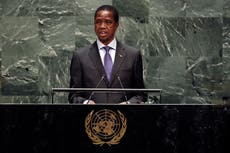As G20 comes to an end, wealthy western nations need to consider writing off Zambia’s debt
At the very least this weekend, leaders can start by regulating their private creditors so they cannot sue the country in the middle of a pandemic
Your support helps us to tell the story
From reproductive rights to climate change to Big Tech, The Independent is on the ground when the story is developing. Whether it's investigating the financials of Elon Musk's pro-Trump PAC or producing our latest documentary, 'The A Word', which shines a light on the American women fighting for reproductive rights, we know how important it is to parse out the facts from the messaging.
At such a critical moment in US history, we need reporters on the ground. Your donation allows us to keep sending journalists to speak to both sides of the story.
The Independent is trusted by Americans across the entire political spectrum. And unlike many other quality news outlets, we choose not to lock Americans out of our reporting and analysis with paywalls. We believe quality journalism should be available to everyone, paid for by those who can afford it.
Your support makes all the difference.Just as Covid-19 affects the whole world, the global debt crisis involves us all. And a microcosm of that crisis is Zambia.
Now, this country close to my heart has defaulted on £3bn of its debt to international creditors, of its total external debt of £12bn, in a move which the Zambia Bondholder Committee this week said “risks establishing a more adversarial backdrop to future discussions with bondholders”.
Against this backdrop of crisis, G20 heads of state, including Boris Johnson, gather this weekend. And when it comes to debt, now is the time for them to change course. Merely suspending debt repayments, as the G20 has so far done, is simply not good enough when creditor nations know that accumulated debts will be even more difficult to pay in 2021 than they are today.
If a deal can be done in Zambia, we can use it as a model, as we potentially face multiple and simultaneous debt defaults and crises in the global south due to a pandemic.
It is more than the usual truism to say that no one is safe until everyone is safe. A prolonged debt crisis in Zambia and elsewhere that takes years to resolve will delay responding to the pandemic, and harm economic recovery, condemning an entire generation.
And more immediately, Zambia is under a different type of threat, with bondholders in London proposing to sue the country following the country’s default. Zambia pays far more in debt servicing – 32.6 per cent of its budget in 2019 – than its proportion of public spending on health – 8.8 per cent – or on helping the poorest during the crisis – 18.6 per cent – or on education spending, which is at 21.8 per cent of the country’s budget.
This debt dilemma is different from those of the past, when the vast majority of debt was owed to western governments in bilateral debt, or to multilateral institutions such as the World Bank and the IMF. In 2020, the vast majority of Zambia’s debt payments are owed to private creditors, who represent 69 per cent of total debt-servicing payments in 2020. Private sector creditors have continued to exclude themselves from critical engagement on debt restructuring and this cannot continue.
Today, we must bring the private creditors as well as Chinese creditors to the table to agree a debt-relief programme that leads to the substantial cancellation of Zambia’s debt repayments due over the next three years to allow the country and others like Zambia to recover from the pandemic and ensure livelihoods, education nd health services are there for the most vulnerable communities, including women and children.
Which brings us directly to the UK’s responsibility, and a question of justice. While Britain cannot take full responsibility for bringing everyone to the table, it must take responsibility for creating the legal environment within its borders to prevent the bondholders from suing. In 2010, the UK parliament passed the UK Developing Countries (Debt Relief) Act. This prevented any creditor suing a country outside the terms of debt relief brokered by the UK at the G8 summit in 2005. The same principle could be used to protect countries from legal action in relation to the Covid-19 debt crisis. As shown in a recent report, Under the Radar, by Christian Aid and other NGOs, the two main groups of debtors who now must come to an agreement are western private creditors, to whom almost all of the Eurobonds are owed, and Chinese entities, to whom an estimated $3bn (£2.25bn) is owed. After all, the bilateral government debts amounting to $3.5bn, including Chinese government lending to Zambia, have already been partially suspended.
Wealthy western nations have a duty to act now. In this season of hope, the G20 leaders have the opportunity to write off the debt – bilateral, multilateral and commercial – and interest for the whole fiscal year 2020 and for 2021. This can be done by including all of creditors in the proposed common framework and enacting supportive domestic legislation to prevent creditor lawsuits. As I have argued throughout this pandemic, this would allow countries to access the finance they need to fight Covid-19, especially in those countries where health infrastructure is appallingly weak.
At the very least this weekend, the leaders can start by regulating their private creditors so they cannot sue Zambia for unpaid debt servicing payments amid the deepest crisis in a century.
Amanda Khozi Mukwashi is chief executive of Christian Aid and the author of ‘But Where Are You Really From?’





Join our commenting forum
Join thought-provoking conversations, follow other Independent readers and see their replies
Comments